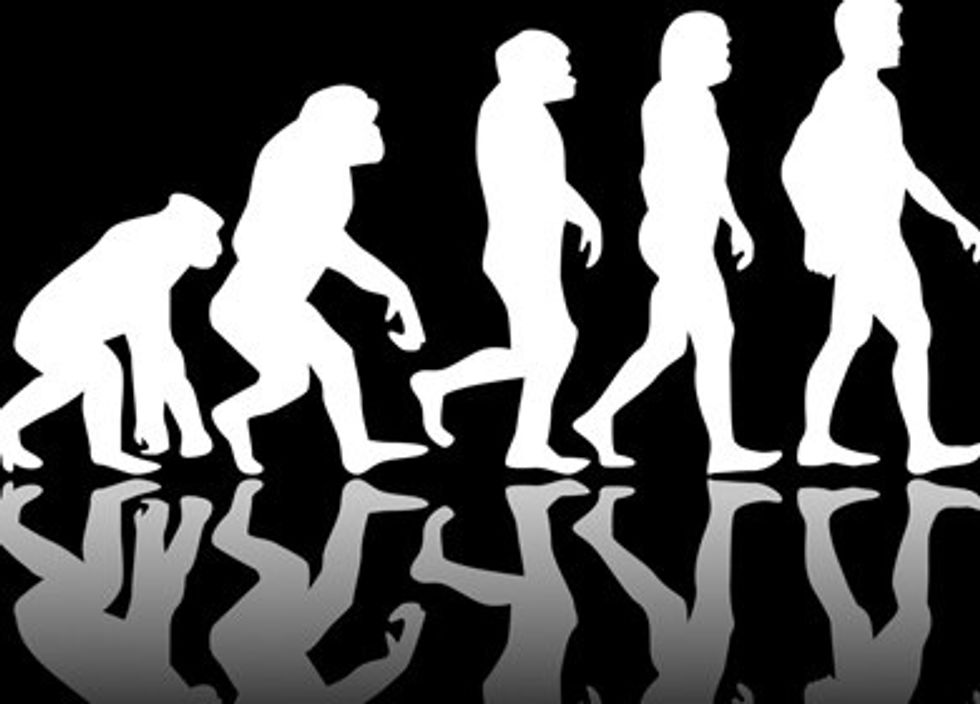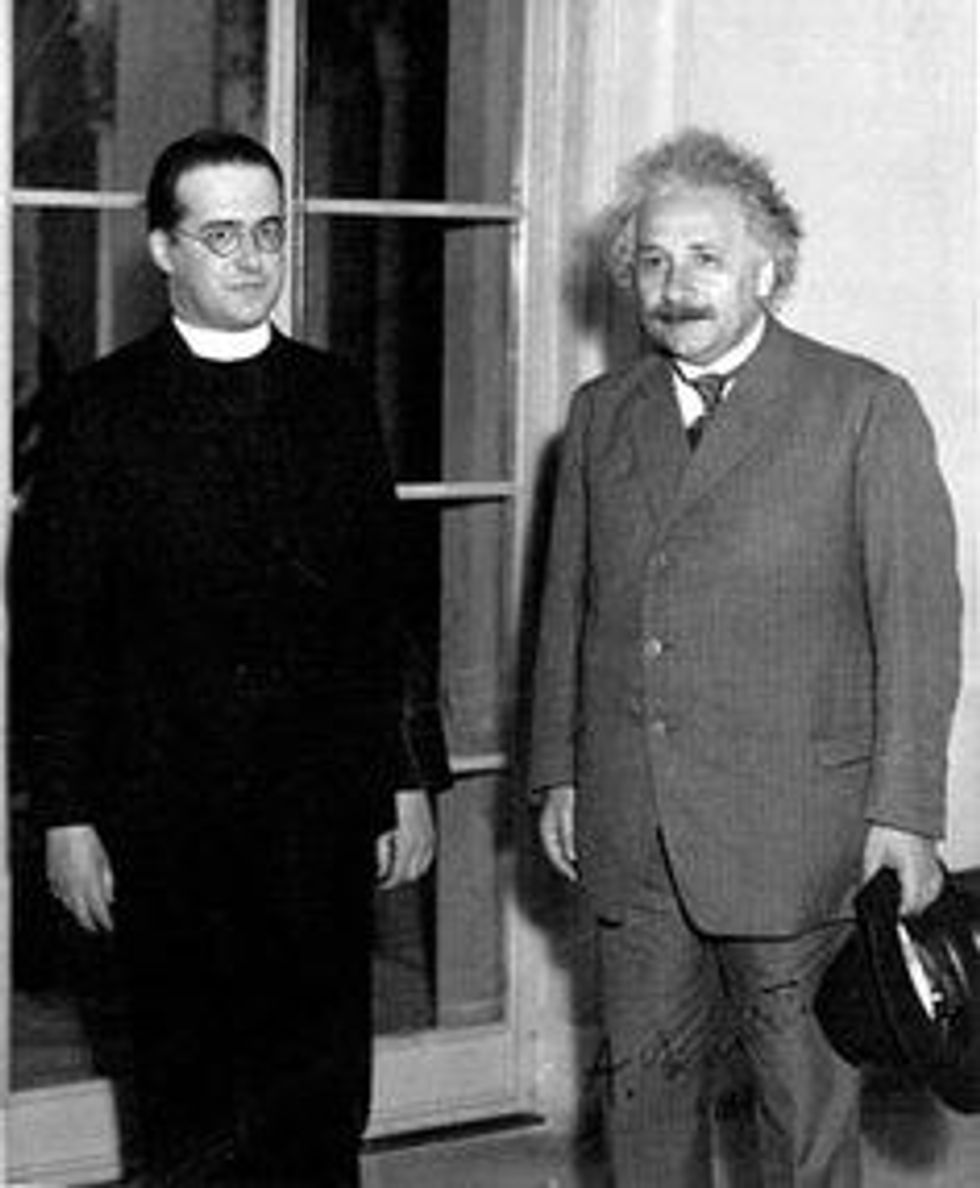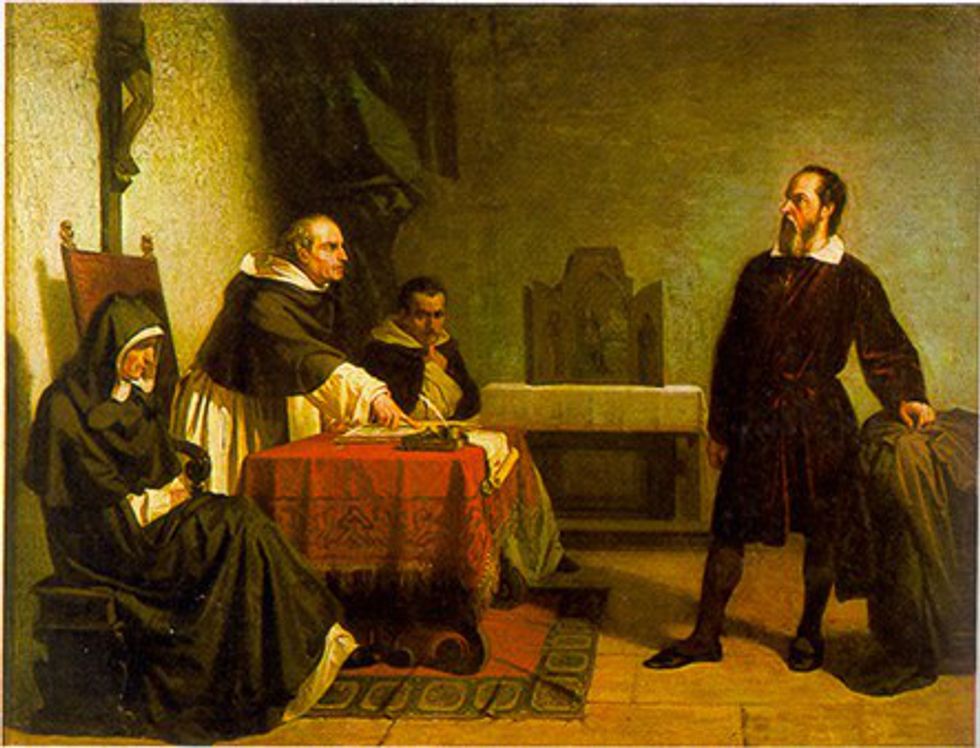"One of the greatest tragedies of our time is this impression that has been created that science and religion have to be at war." - Francis Collins, one of the Project Heads of the Human Genome Project.
Indeed, it seems like people are often eager to pit the two against one another as mortal enemies. However, far too often, those people who ridicule others for being ignorant about science are themselves being ignorant, as they haven't bothered to see what religions actually preach.
Christianity is a broad umbrella term in which beliefs vary greatly. So much so that many acts of religious intolerance can occur between people who feel other people or denominations are "practicing Christianity incorrectly." Generalizing that all Christians believe any one thing about science is fairly ridiculous.
However, we can say things that are more definite about particular denominations of Christianity: specifically Catholicism, which has a set doctrine (others may or may not have differences even within the denomination). Here are some of the most common misconceptions about Catholicism -- the oldest branch of Christianity and the religion I practice -- and science that I've heard.
Myth 1: Catholics practice creationism
This is just plain incorrect. Now, do some Catholics practice creationism? Well, it's definitely possible. I have heard of it occasionally happening. But it's absolutely not Church doctrine. That's just the person on their own deciding to go against science. If they try to use religion as their reason for not believing in evolution, well, then that's just wrong. They should 'fess up to it being their own opinions, instead of pinning it on the Church.
So how long has the Church been against Creationism?
All the way back in 1950 when this debate was becoming more popular, Pope Pius XII said that he saw no problem with evolution, provided that "souls are immediately created by God."
Then in 1996, Pope John Paul II said, "New knowledge has led to the recognition of the theory of evolution as more than a hypothesis. It is indeed remarkable that this theory has been progressively accepted by researchers, following a series of discoveries in various fields of knowledge." He then goes on to state what the significance of a theory is, about how it is constantly verified by facts and consistent with observed data. This strong endorsement of evolution was praised by contemporary evolution proponents. Dawkins, an atheist scientist recently was uninvited from a conference on science and skepticism for his hate speech, was one of the few still critical of the Pope and framed him as not being truly in support of evolution.
Furthermore, in terms of the teaching evolution versus teaching creationism in schools debate, creationism has no place in a Catholic school. Bishop Francis X. DiLorenzo, chair of the U.S. Conference of Catholic Bishops' Committee on Science and Human Values, says, "Assured that scientific truth and religious truth cannot be in conflict, Catholic schools should continue teaching evolution as a scientific theory backed by convincing evidence."
Most of Creationism comes from the idea of taking the Bible literally, as in every single word -- particularly the creation story of Genesis -- must be absolute truth. Catholic Church doctrine directly contradicts that idea: "Scripture presents the work of the Creator symbolically as a succession of six days of divine ‘work,’ concluded by the ‘rest’ of the seventh day" (CCC 337). Please note the term symbolically. Not literally, but symbolically.
And when exactly did the Church begin believing the Bible should not be taken literally?
It's hard to pinpoint one moment, but one of the "Doctors of the Church", St Thomas Aquinas, back in the 13th century, was known for distinguishing between the literal sense and the spiritual sense of the Bible. While this was not doctrine, Thomas Aquinas' writings have been and are still highly regarded in the Catholic Church.
Myth 2: Catholics don't support the Big Bang Theory
One of these men was crucial in creating the Big Bang Theory. No, it wasn't Einstein. It was the Catholic priest on the left, Fr. Georges Lemaître, a Belgian priest and professor of physics at Catholic University of Leuven. He proposed the theory of the expansion of the universe, which was later corroborated by Hubble, and is central to what is now known as the Big Bang Theory, which he called the "hypothesis of the primeval atom". Therefore, it's a bit... well... hilarious when news reporters get excited that the Pope is "beginning" to agree with scientists.
Facts are, the Pope Pius XII, the current Pope when Fr Lemaître came out with his theory, was overjoyed, as he saw it as evidence of a Creator. Lemaître actually advised the Pope to be less supportive of it -- as he was not yet certain of his theory. You know who wasn't overjoyed? Atheists and other less religious people who viewed it as depending on religion, particularly because Fr Lemaître was so crucial in the theory's creation.
In the end, not sure how this got twisted around to the Catholic Church being behind on the times when it is so drastically reversed. Now if the Big Bang Theory is suddenly proved false (which is certainly possible as there are still many unanswered questions and complications) and the Catholic Church is hesitant to move away from it since it seems to love it so much, then it would make sense to criticize it as being behind on the times. But right now, it's laughable any time the media gets it wrong.
Myth 3: Galileo vs. the Catholic Church
This story is not exactly Hollywood material. In reality, kind of boring. Not to mention, he was neither original nor correct.
But wait, a heliocentric world was so astonishing at that time!
No, it wasn't. Copernicus -- who happened to be part of the Catholic clergy -- created a heliocentric system first. And what horrid tortures did the Catholic Church have in store for him? Ummm... nothing. He had a pretty good relationship with the Catholic Church, seeing as he was a part of it. His book did in fact get put on the Index of Banned Books, but not until 1616. And it had been published in 1543. And yes, the Index existed when he first published. It was merely a matter of it did not seem heretic until Galileo used it as he did. So that's 73 years of the Catholic Church being passive about a text about a heliocentric planetary model being passed around. And he wasn't the only one. Kepler, a contemporary to Galileo, used a heliocentric model as well. So not that new.
But wait, he was correct, though!
Eh... sort of. He got something majorly wrong. He made the planets move in perfect circles, even though Kepler had placed them in ellipses. Without the ellipses, the math and observations just don't add up correctly. So he wasn't even right. And he was very insistent everyone take his model to be the best one, even though his contemporary had one which was far more accurate. History could just have easily remembered Galileo as the man who insisted everyone take his incorrectly circular orbit model seriously.
So in short, not too irrational to not accept "his" model. It was more Galileo's attitude about Copernicus' model which go him into trouble, and got the otherwise accepted Copernican text suddenly on the Index of Banned Books. And even then, the Catholic Church first just issued him a warning, particularly as they were the ones who had up to this point been funding and supporting his work. They even said he could publish on the matter as long as he didn't take sides. If you've ever read the "Dialogue Concerning the Two Chief World Systems," it's pretty damn biased. Structured as a debate... with the smart character defending a heliocentric world and "Simplicio" idiotically sticking to a geocentric model and not even knowing what it was. So yeah, that didn't go over too well. But the whole intense, torture filled trial? Eh, they mostly just asked him to stop talking about the heliocentric model and gave him the equivalent of house arrest. He was pretty old at that point, so he reluctantly agreed. Oh, and he still published after that. Granted, it was less overtly heliocentric, but... there were certainly traces of it in there. The Pope at that time seems to have just ignored that one.
And the whole "the Catholic Church was against Galileo until the 1990's! Haha." Um... yeah. It was more of a matter that they didn't feel the need to do more about it until they realized people were still making a big deal about it. His texts had removed from the Index of Banned Books in the early 19th century when a priest wrote a text on heliocentricism with the Church's blessing to do so.
So all in all, kind of a lame story there. And even after that, it's a 400-year-old story. Anyone who tries to use Galileo to prove some point about the Church being behind on the times... is really just showing that they are 400-years behind the times. And for those of you whose vision of Galileo was just shattered, don't worry. There's lots of amazing stuff to love him for. Just not his inaccurate, even though he totally had the ability to be accurate, planetary model.
Myth 4: Catholics don't care about science or science education
Please. Usually this comes up in the context of educating on evolution... Big Bang Theory... huh. If you believe the Catholic Church has an issue with either of those, please refer to points 1 and 2.
That being said, Catholic schools actually have a history of having pretty good science. Physics historian Professor Heilbron at UC Berkeley says, "Roman Catholic Church gave more financial aid and social support to the study of astronomy over six centuries, from the recovery of ancient learning during the late Middle Ages into the Enlightenment, than any other, and probably, all other institutions."
In particular, the Jesuits, a specific order of priests, are known for their science, particularly in seismology which is sometimes called "the Jesuit Science." Jesuits also have founded several accomplished universities and colleges which have science programs. They also run several other schools at various levels, such as the secondary school that Fr. Lemaître attended. Another fun fact, Lamark, who created the first evolutionary theory, was also Jesuit educated. They graduate some pretty cool people!
While obviously the priority is theology, not religion, the Catholic Church does in fact support science education quite often and is willing to speak up in support of science
Myth 5: People against vaccinations do so for religious reasons
Hell no. People are against vaccinations because of some completely 100 percent fraudulent, pseudoscience "study" that falsely linked it to autism. There is no scientific reason against vaccinations. And as far as the Catholic Church is concerned, they see absolutely no religious reason for being against them. Dr. Paul Braaton, a past president of the Catholic Medical Association, says, "The link with autism we now know came from some bad science and manipulated research out of England." Some Catholic theologians even believe there is a moral obligation to vaccinate anyone who can be vaccinated.
Myth 6: All scientists are atheists
Well, that's quite easily a no. Open any history book and the majority of scientists are going to be Catholic, since it would have been fairly difficult to find funding for that kind of research otherwise during early modern natural philosophy (the field that is mainly today considered physics and philosophy, but also includes other science, math, and theology). The Protestant Reformation gave way to some other prominent Christian scientists such as Kepler, but the bulk of them were still Catholic.
But even if you amend the statement to say all modern scientists are atheists... you'd still be wrong. Massively wrong. Here's a very incomplete list of just Catholic modern (no earlier than last century) scientists -- ignoring the many, many other scientists of other denominations and other religions since that would be even more massive.
Francisco J Ayala: former Dominican (an order of priests) who has been called the "Renaissance Man of Evolutionary Biology"
Martin Stanislaus Brennan: an American priest and scientist who wrote extensively on religion and science
Sister Celine: a religious sister who created "Sister Celine's polynomials"
Sister Mary Kenneth Keller: first American woman to earn a PhD in Computer Science who created the computer language BASIC and was instrumental in making computer science accesible
Craig Mello: co-discovered RNA interference
Mario J Molina: holds a Nobel Prize in Chemistry and is the climate policy adviser to the President of Mexico
Joseph Murray: a surgeon who received the Nobel Prize in Physiology or Medicine, who says, "Is the Church inimical to science? Growing up as a Catholic and a scientist — I don't see it."
John von Neumann: a Catholic convert who made major contributions in math, physics and computer science
Sister Paula: a member of the Sisters of Charity who is known for her solar energy work and has been nicknamed "Solar Nun"
Good luck doing science without using the work of Catholic scientists. Heck, I can't even do my homework due for Computational Partial Derivatives this very week without using Neumann's work (that guy has come up in several of my courses), and would be dying in computer science if Sister Keller hadn't started the trend of making computer languages more usable.
Growing up as the daughter of a Catholic engineer-turned-math-and-physics-teacher and a Catholic computer scientist, I never found that my religion conflicted with science, nor did science conflict with my religious beliefs. And I loved the science program at my Catholic K-8 school, which they poured a decent amount of money into.
So if you ever feel like making a generalization about religion, particularly one that paints religious people as unintelligent, take a step back and make sure you're not the one being unintelligent. But if you want to criticize anti-vaxxers or creationists, please be my guest. Just keep in mind, these are the views of few, not all, religions, and certainly not Catholics.
And for the next person who asks me the same old tired question, yes, I am studying physics. Yes, I am Catholic. And no, I don't see any problem with that. And neither should you.



























